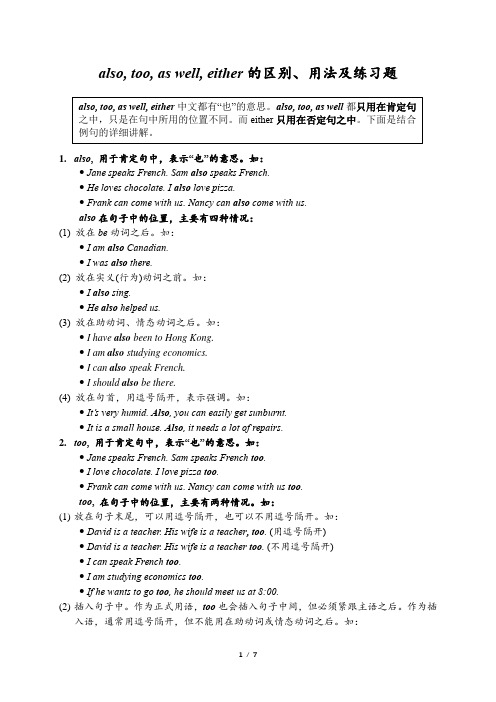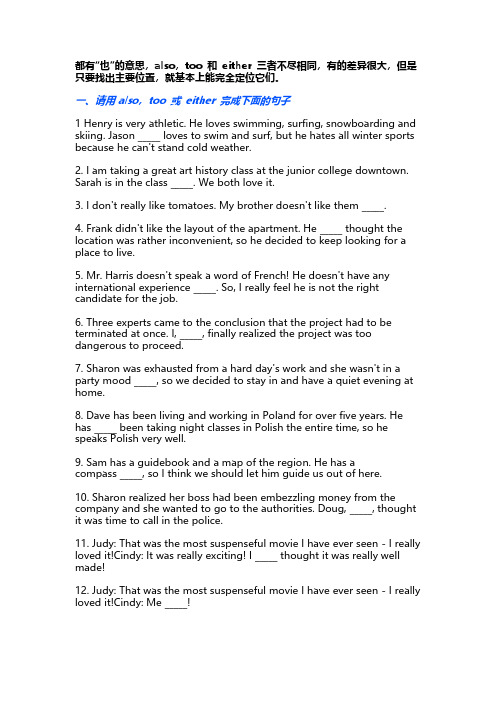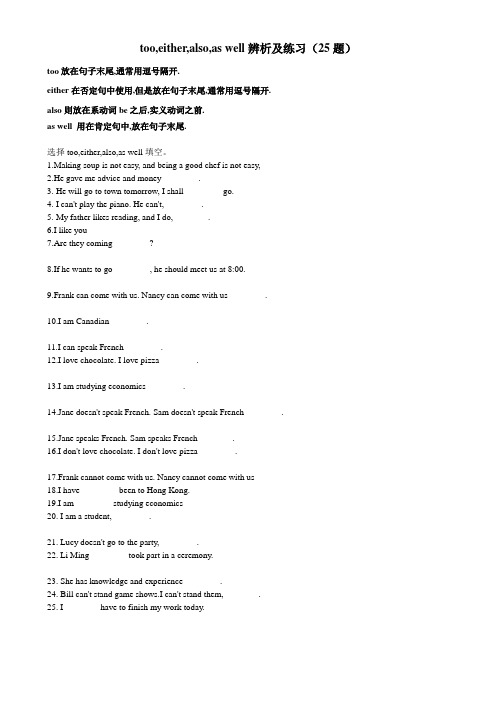also,too和either区别练习学习资料
- 格式:doc
- 大小:18.00 KB
- 文档页数:3

also, too, as well, either的区别、用法及练习题1.also, 用于肯定句中,表示“也”的意思。
如:Jane speaks French. Sam also speaks French.He loves chocolate. I also love pizza.Frank can come with us. Nancy can also come with us.also在句子中的位置,主要有四种情况:(1) 放在be动词之后。
如:I am also Canadian.I was also there.(2) 放在实义(行为)动词之前。
如:I also sing.He also helped us.(3) 放在助动词、情态动词之后。
如:I have also been to Hong Kong.I am also studying economics.I can also speak French.I should also be there.(4) 放在句首,用逗号隔开,表示强调。
如:It’s very humid. Also, you can easily get sunburnt.It is a small house. Also, it needs a lot of repairs.2.too, 用于肯定句中,表示“也”的意思。
如:Jane speaks French. Sam speaks French too.I love chocolate. I love pizza too.Frank can come with us. Nancy can come with us too.too, 在句子中的位置,主要有两种情况。
如:(1)放在句子末尾,可以用逗号隔开,也可以不用逗号隔开。
如:David is a teacher. His wife is a teacher, too. (用逗号隔开)David is a teacher. His wife is a teacher too. (不用逗号隔开)I can speak French too.I am studying economics too.If he wants to go too, he should meet us at 8:00.(2)插入句子中。

also too either neither的区别在日常英语学习中,我们经常会遇到also、too、either和neither这几个词,它们在句子中的作用和用法容易让人混淆。
下面我们将逐一分析这些词的含义和区别,并通过实例来帮助大家更好地理解和运用它们。
1.also(也)Also通常放在句子的开头,用于强调某个观点或事实。
它的作用是表示两个或多个事物之间的相似性或共同点。
例如:- Also,I like playing football.(我也喜欢踢足球。
)2.too(也)Too放在句子的末尾,表示某个观点或事实也适用于另一个人或事物。
需要注意的是,too后面要跟逗号,然后再加另一个动词。
例如:- She is beautiful,too。
(她也很漂亮。
)3.either(要么)Either表示两个或多个事物中的任意一个。
它用于提供选择,并表示没有偏好。
例如:- Would you like tea or coffee?(你想要喝茶还是咖啡?)4.neither(neither表示两个或多个事物都不适用或不包括在内。
例如:- They didn"t attend the party.(他们没参加派对。
)了解了这几个词的含义和用法后,我们在实际应用中要注意根据语境选择合适的词汇。
以下是一些建议:- 当你想表达两个或多个事物之间的相似性时,可以使用also。
- 当你想表达某个人或事物也具有某种特征时,可以使用too。
- 当你提供选择时,可以使用either。
- 当你想表示某个人或事物都不适用或不包括在内时,可以使用neither。
通过以上分析,我们对also、too、either和neither这几个词有了更深入的了解。

都有“也”的意思,also,too 和either 三者不尽相同,有的差异很大,但是只要找出主要位置,就基本上能完全定位它们。
一、请用 also,too 或either 完成下面的句子1 Henry is very athletic. He loves swimming, surfing, snowboarding and skiing. Jason _____ loves to swim and surf, but he hates all winter sports because he can't stand cold weather.2. I am taking a great art history class at the junior college downtown. Sarah is in the class _____. We both love it.3. I don't really like tomatoes. My brother doesn't like them _____.4. Frank didn't like the layout of the apartment. He _____ thought the location was rather inconvenient, so he decided to keep looking for a place to live.5. Mr. Harris doesn't speak a word of French! He doesn't have any international experience _____. So, I really feel he is not the right candidate for the job.6. Three experts came to the conclusion that the project had to be terminated at once. I, _____, finally realized the project was too dangerous to proceed.7. Sharon was exhausted from a hard day's work and she wasn't in a party mood _____, so we decided to stay in and have a quiet evening at home.8. Dave has been living and working in Poland for over five years. He has _____ been taking night classes in Polish the entire time, so he speaks Polish very well.9. Sam has a guidebook and a map of the region. He has acompass _____, so I think we should let him guide us out of here.10. Sharon realized her boss had been embezzling money from the company and she wanted to go to the authorities. Doug, _____, thought it was time to call in the police.11. Judy: That was the most suspenseful movie I have ever seen - I really loved it!Cindy: It was really exciting! I _____ thought it was really well made!12. Judy: That was the most suspenseful movie I have ever seen - I really loved it!Cindy: Me _____!13. I am really tired, and I don't feel like going out tonight _____. Let's just stay home tonight.14. I don't really feel like going out tonight, and I am _____ really tired. Let's just stay home tonight.15. Jim is an amazing skiier, and he loves to snowboard _____.二、答案、参考翻译及解析1. also亨利很有运动天赋。

tooeitheralso的用法和区别"Too", "either"和"also"都是英语中常见的副词,它们在句子中有着不同的用法和含义。
1. "Too" (也/太):- 当"too"用于表示也时,它可以放在句子中一个肯定句的末尾,用来加强陈述。
例如:I like pizza too.(我也喜欢披萨。
)- 当"too"用于表示过度的意思时,它通常放在形容词或副词的前面,用来描述一些事物的程度超过了正常或期望的范围。
例如:The coffee is too hot to drink.(咖啡太烫了,无法喝。
)- "too"也可以用在肯定句的前面,表示"也"。
此时,句子中常使用倒装结构。
例如:Too difficult is the problem for me to solve.(对我来说这个问题也太难了。
)- "too"可以作为连词,引导结果状语从句,表示一个结果使一些行为变得困难或不可能。
例如:She overslept, too, which made her arrive late to work.(她也睡过头了,这使她上班迟到了。
)2. "Either" (也/两者之一):- "either"表示在两个或多个人、物或观点中的一个。
例如:You can choose either red or blue.(你可以选择红色或蓝色。
)- "either"可以放在句子中一个否定句的末尾,表示"也"。
例如:I don't like coffee either.(我也不喜欢咖啡。
)- "either"也可以引导让步状语从句,表示出乎意料的结果。

too,either,also,as well辨析及练习(25题)too放在句子末尾,通常用逗号隔开.either在否定句中使用,但是放在句子末尾,通常用逗号隔开.also则放在系动词be之后,实义动词之前.as well 用在肯定句中,放在句子末尾.选择too,either,also,as well填空。
1.Making soup is not easy, and being a good chef is not easy, ________2.He gave me advice and money ________.3. He will go to town tomorrow, I shall ________ go.4. I can't play the piano. He can't, ________.5. My father likes reading, and I do,________.6.I like you________7.Are they coming ________?8.If he wants to go ________, he should meet us at 8:00.9.Frank can come with us. Nancy can come with us ________.10.I am Canadian ________.11.I can speak French ________.12.I love chocolate. I love pizza ________.13.I am studying economics ________.14.Jane doesn't speak French. Sam doesn't speak French ________.15.Jane speaks French. Sam speaks French________.16.I don't love chocolate. I don't love pizza ________.17.Frank cannot come with us. Nancy cannot come with us ________18.I have ________ been to Hong Kong.19.I am ________ studying economics20. I am a student, ________.21. Lucy doesn't go to the party, ________.22. Li Ming ________ took part in a ceremony.23. She has knowledge and experience ________.24. Bill can't stand game shows.I can't stand them,________.25. I ________have to finish my work today.。

(完整版)also,too和either区别练习知识点补给站一.用too,also,either或as well填空:1)I'll go to see the film,_________.2)If you don't come here,I shouldn't, ______ .3)I,________ ,will help him.4)Jack can speak Chinese,and his brother can ____ speak Chinese.二.用look(at), see, watch, read 填空1.Let's go to ________a movie.2.I often _____English in the morning.3.He often _______TV in the evening.4.Let me _________ your picture.三. 用good, well, nice, fine填空1、This kind of bicycle sells____?A.goodB.wellC.niceD.fine2、This kind of shirt looks ____and sells____.A:nice. well B : well, nice C : good,good3、The flowers smell so ?A:well B:nice C:wonderfully D:nicely4、The flowers look very _______.A.niceB.nicelyC.beautifullyD.well5、The music sounds _______.A.wellB.nicelyC.goodD.beautifully四.with的用法一、with表拥有某物Mary married a man with a lot of money . 马莉嫁给了一个有着很多钱的男人。
also too either的用法区别
also too either的用法区别:
1.also 通常用于肯定句中,其位置一般在行为动词之前,特殊动词之后,或者紧邻行为动词。
当用作并列连词时,它可以连接两个相同意义的词语,表达“也”的含义。
例如:"He is a teacher, and also an engineer."(他既是老师又是工程师。
)
2.too 一般用于肯定句中,也可以用于否定句,但其位置相对灵活,可以放在句末,也可以插入句中,前后通常会用逗号分隔。
在肯定句中使用时,"too" 可以用来加强语气,表明数量过多或程度过高。
例如:"The cake was delicious, and she ate too much of it."(蛋糕很好吃,她吃得太多了。
)
3.either 主要用于否定句中,表示除了某人或某事之外的其他选择。
它的位置通常在句末,有时也会放在句首,这时其后通常会有逗号。
例如:"Neither do I know the answer, nor does he."(我也不知答案,他也不知。
)
综上所述,also 更适合用于肯定句中以突出并列项,而too 既可以用于肯定句中以强化语气,也可以在否定句中表示排除其他选项。
either 则主要用于否定句中,用以排除两种可能性中的任意一种。
在使用时,应根据句子的类型和语境来选择合适的词汇。
a sw e l l,e i t h e r,a l s o, t o o的区别精品资料as well, either, also, too的区别1.also用于肯定句,既可表示两人干了同样的事,也可表示一个人干了两件事,通常位于be动词,助动词或情态动词之后,行为动词之前。
如:He has been to Beijing. I have also been there.他去过北京,我也去过。
He is good at English. He is also good at Japanese.他擅长英语,也擅长日语。
I also wants some tea.我也要点茶。
注意:表示强调时,also也可放在助动词或情态动词等之前。
比较:I can also do it.我也能干。
I also can do it.(同上)2.too也用于肯定句,比also更通俗,和also, as well可以相互替换,可放在句中,也可放在句末。
如:Xiao Li went to Beijing and Xiao Zhao, too, went to Beijing.小李到北京去了,小赵也到北京去了。
He studies hard and I study hard, too.他学习用功,我(学习)也用功。
3.either用于否定句,而且只能放在句末。
如:He didn’t know it.I didn’t know it either.他不知道那件事,我也不知道。
I can’t speak French and can’t write it, either.我不会讲法语,也不会写法语。
4.as well在口语中用得很多,用法和too完全一样,可以互换,通常位于句末。
[见as well, as well as条]。
如:She not only sings,she plays the piano as well.她不但会唱歌,而且会弹钢琴。
also, too, either, as well:“也”是有区别的(讲解+练习)(1)too, as well和also用于肯定句和疑问句,too和as well一般放在句末。
而also一般放在句中与动词连用,either用于否定句和否定的疑问句,往往放在句末。
如:He went there,too. 或者He also went there. 他也去那儿。
He didnt go there,either.他也没去那儿。
I like you as well.我也喜欢你。
(2)顺便提一下:as well as用作连词引出比较从句,其义为“和…一样好”。
因此,“He speaks Spanish as well as English.”应译作:“他说西班牙语像说英语一样好。
”练习:A. Mr. Green can _____speak Chinese well.B. I havent heard from him. She hasnt heard from him, ______.C. I have been to Beijing twice, _____.D. People in Korea celebrate the Spring Festival _____.4. ago,before:“之前”二者意思相似,但用法很不一样。
(1)ago通常和一般过去时态的动词连用,前面是一个表示时间段的词或短语。
如:We started our class about ten minutes ago.我们大约十分钟前开始上课的。
(2)before通常用来表示在某个时间点之前。
如:We started our class before eight oclock.我们八点前开始上课的。
(不能说eight o clock ago)(3)before可以单独用作状语,而ago则不能这样用。
如:I read about it in a newspaper before.我以前在一张报纸上看到过这件事。
also, too, as well, either的区别、用法及练习题1.also, 用于肯定句中,表示“也”的意思。
如:Jane speaks French. Sam also speaks French.He loves chocolate. I also love pizza.Frank can come with us. Nancy can also come with us.also在句子中的位置,主要有四种情况:(1) 放在be动词之后。
如:I am also Canadian.I was also there.(2) 放在实义(行为)动词之前。
如:I also sing.He also helped us.(3) 放在助动词、情态动词之后。
如:I have also been to Hong Kong.I am also studying economics.I can also speak French.I should also be there.(4) 放在句首,用逗号隔开,表示强调。
如:It’s very humid. Also, you can easily get sunburnt.It is a small house. Also, it needs a lot of repairs.2.too, 用于肯定句中,表示“也”的意思。
如:Jane speaks French. Sam speaks French too.I love chocolate. I love pizza too.Frank can come with us. Nancy can come with us too.too, 在句子中的位置,主要有两种情况。
如:(1)放在句子末尾,可以用逗号隔开,也可以不用逗号隔开。
如:David is a teacher. His wife is a teacher, too. (用逗号隔开)David is a teacher. His wife is a teacher too. (不用逗号隔开)I can speak French too.I am studying economics too.If he wants to go too, he should meet us at 8:00.(2)插入句子中。
a l s o,t o o和e i t h e r
区别练习
知识点补给站
一.用too,also,either或as well填空:
1)I'll go to see the film,_________.
2)If you don't come here,I shouldn't, ______ .
3)I,________ ,will help him.
4)Jack can speak Chinese,and his brother can ____ speak Chinese.
二.用 look(at), see, watch, read 填空
1.Let's go to ________a movie.
2.I often _____English in the morning.
3.He often _______TV in the evening.
4.Let me _________ your picture.
三. 用good, well, nice, fine填空
1、This kind of bicycle sells____?
A.good
B.well
C.nice
D.fine
2、This kind of shirt looks ____and sells____.
A:nice. well B : well, nice C : good,good
3、The flowers smell so ?
A:well B:nice C:wonderfully D:nicely
4、The flowers look very _______.
A.nice
B.nicely
C.beautifully
D.well
5、The music sounds _______.
A.well
B.nicely
C.good
D.beautifully
四.with的用法
一、with表拥有某物
Mary married a man with a lot of money . 马莉嫁给了一个有着很多钱的男人。
__________________________________________________ 我经常梦想有一个带花园的大房子。
二、with表用某种工具或手段
Tom drew the picture with a pencil . 汤母用铅笔画画。
__________________________________________________ 他在用铅笔写字。
三、with 表原因或理由
John was in bed with high fever . 约翰因发烧卧床。
__________________________________________________ 他因高兴跳起来。
四、with 表“带来”,或“带有,具有”,在…身上,在…身边之意
Do you have money with you . 身上带着钱吗?
__________________________________________________ 随身带伞,以防下雨。
五、with表示让步,“虽有,尽管”
With good teachers and warmhearted classmates ,the new comer feels lonely .
虽有着好老师和热心的同学,这个新来的还是感觉孤独。
__________________________________________________ 有着钱和名誉,他还是不快乐。